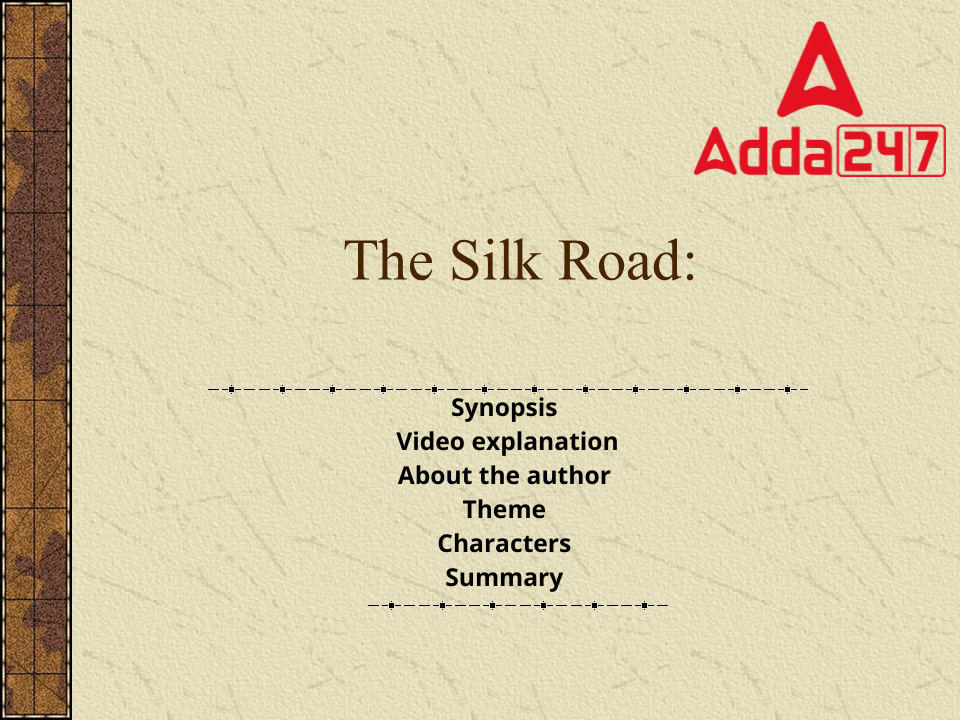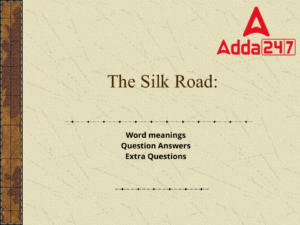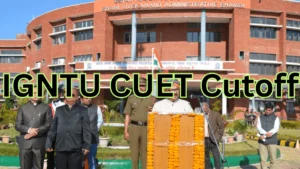We have provided NCERT Solutions for Class 11 English Hornbill Reading Skills Chapter 8 Silk Road to help students with their studies and exam preparation. The answers in this chapter have been produced by subject-matter experts who have a great deal of experience in the field. To help students understand the story, all of the textbook questions have clear English answers. The concepts covered in these Class 11 English NCERT Solutions would be easier for students to understand. In this article, we have provided students with the video explanation, summary, solutions, and meaning of difficult words.
Silk Road Summary Class 11 Chapter 8 Introduction
Silk Road: The story is written by Nick Middleton. This chapter is about the narrator’s adventure from the slopes of Ravu to Mount Kailash to finish the kora. To bid him farewell, Lhamo gave him an extended-sleeve sheepskin coat. He hired Tsetan’s car for his adventure and took Daniel to escort him to Darchen.
Silk Road Summary Class 11- Video Explanation
The video explanation for this chapter has been given below by the subject expert. Every student must go through this video explanation so that they can retain all the content related to this chapter. This will help students memorize all the concept on their fingertips. Click here for a video explanation
Silk Road Class 11 Summary- About the author

Nick Middleton is the author of the story “Silk Road.”
Nick Middleton (born 1960) is a British physical geographer and a supernumerary fellow of St Anne’s College, Oxford. He specializes in desertification.
Middleton was born in London, England. As a geographer, he has travelled to more than 70 countries. In Going to Extremes, a Channel 4 television program about extreme lifestyles, he experienced life in the hostile conditions that other cultures must endure. His book Silk Road is included in the NCERT’s class 11 textbook.
Silk Road Summary Class 11 Chapter 8- Characters
The Author: He is a Professor of Geography at Oxford University and an environmental consultant.
Tsetan: He is the owner of the car hired by the author for the voyage, as well as a tourist guide.
Norbu: He is a Tibetan working at an academy in Beijing who wants to carry out the pilgrimage to Mount Kailash.
Silk Road Class 11 English Chapter 8- Summary
The main character desired to visit Mount Kailash to finish the kora. To transport him to Mount Kailash, he hired Tsetan. As a farewell gift, Lhamo gave him a long-sleeved sheepskin coat. He took Daniel as his companion till Darchen.
Tsetan took a direct shortcut to Mount Kailash when they first set out on their journey, going to the southwest. They had to cross high mountain passes to reach their destination. Tsetan assured him that it would be no problem if there would be no snow. They crossed through a few gazelles, a herd of wild asses, and shepherds tending the flocks.
When they reached the hill, they passed dark tents, which were home to nomads. He saw a Tibetan mastiff standing outside the tent as a guard. These mastiffs ran after his car as he approached the tents. These dogs had large jaws.
As soon as they entered the valley, they witnessed snow-capped mountains with rivers flowing, which were blocked with ice. When they were riding through the hill, the turns became sharper and the roads became bumpier. Tsetan was driving in third gear. The protagonist could feel the pressure in his ears. He held his nose and snorted to clear the congestion. He checked his wristwatch, they were at 5210 meters above sea level.
They reached their first hurdle, which was a road filled with snow. Tsetan threw dirt on the snow and drove carefully on that road. They resumed their journey. The protagonist felt his head was hurting. He took a few sips of water from his water bottle. They were still climbing up the hill. They reached 5515 meters above sea level. They stopped again, and this time the fuel tank hissed when Testan unscrewed the top. As the petrol was expanding due to low atmospheric pressure, Tsetan told them not to smoke around it.
Soon in the afternoon, around two o’clock, they stopped for lunch. The protagonist’s headache was gone by now. By late afternoon, they reached a small town called “Hor”’. They reached the east-west highway again. It was the old route from Lhasa to Kashmir. Daniel got off the car and took a lift to Lhasa. Their car had a few punctures, which worried Tsetan. He got them fixed and the protagonist waited at a local café for Hor while having a glass of tea. He found Hor a miserable place. After a while, Tsetan reached out to him and they resumed their journey again.
At night, around 10.30 pm, they stopped at a guest house in Darchen to spend the night. The protagonist got ill and suffered from congestion due to the change in altitude and cold weather. He stayed awake all night. The next morning, Tsetan took him to a Tibetan medical college where he consulted a Tibetan doctor, who gave him a five-day course of medicine in a brown envelope.
The protagonist was feeling good after taking a full day of medicine. Tsetan left him thereafter, assuring his health condition. The protagonist was staying at Darchen. That place had a general store where Chinese cigarettes, soap, and other things were available. In the afternoon, the men gathered at a shabby table to play pool every day. Women would wash their hair in the narrow stream. Darchen had one problem; it had no pilgrims. According to the local people, in the peak season of pilgrimage, the place would be filled with travellers. He met a person in Darchen’s only café. His name was Norbu, and he was a Tibetan working in Beijing at the Institute of Ethnic Literature of the Chinese Academy of Social Science. He came to Darchen to complete the kora just like the protagonist. He was fat and found it difficult to walk. The protagonist decided to go on the pilgrimage with him. They hired yaks to carry their luggage. Norbu He finally said it is not possible for him while he collapsed across the table and laughed hilariously. His tummy was also too big.
Silk Road Summary Class 11- Word Meanings Explanation
Any chapter in English might contain several difficult words that may seem difficult to students. These difficult words are used to confuse students in exam. For the sake of students, we have compiled a list of all the difficult words of this chapter and have given their meaning.
French loaves – a thin loaf of French bread commonly made from basic lean dough
ducking back – quickly going inside
kora – pilgrimage (in the Tibetan language)
Drogba – nomad shepherd (here it means, “You look like a nomad shepherd.”)
Changtang – plateau in Western Tibet
gazelles – small antelopes
void – empty spaces
kyang – wild asses
pall – cloud
en masse – together
manoeuvres – exercises involving a large number of animals
billowed – swelled out and went
mastiff – a large and strong breed of dog
tribute – payment for tax
clogged – jammed
meanders – winding curves or bends of the river
daubed – spread on the surface
hunks – large pieces
snorted – made a loud sound by forcing breath through a nostril
exited – came out of
swathe – a long strip
petered out – gradually came to an end
wristwatch – a watch having an altimeter worn on the wrist
negotiated – went around
four-wheel drive – having a transmission system to provide power directly to all four wheels
lurching – moving unsteadily
cairn of rocks – pile of stones marking a special place
festooned – ornamentally decorated
careered down – descended
salt flats – areas of flat land covered with a layer of salt
brackish – slightly salty
vestiges – remains
a hive of activity – full of people working hard
as smooth as my bald head – totally worn out
grim – bleak or dreary
refuse – rubbish
venerated – respected
cosmology – ancient history
headwaters – streams forming the source
striking distance – a distance from which it can be easily reached
draught – current of air
spread the grease around on – cleaned
solitary confinement – loneliness
sanctity – holiness
hallowed – holy
prone – inclined
kicking around – passing time aimlessly
set off – started
nocturnal – happening at night
power – breathing
drifting off – going to sleep
disappearing into the land of nod – going to fall asleep
put my finger on – pinpoint
paraphernalia – dress identifying his profession
screws of paper – small paper packets
derelict – run down
pool – a game similar to billiards
supremely
incongruous – totally out of place
babbled – flowed with a babbling sound
cavernous – like a cave
struck up – started
escaped from the library – removed themselves from academic work
tempered – weakened
envisaged – thought of
yaks – Tibetan ox
prostrating – stretching and lying down with face down
tummy – stomach
Join the Adda247 Saksham batch by clicking on this link.
Silk Road Summary- Question Answers from the Textbook
Silk Road Understanding the text
- Give reasons for the following statements.
Question 1. The article has been titled ‘Silk Road.’
Answer: The article has been titled “Silk Road” because it records the author’s expedition to Mount Kailash through the Silk Road region. The name Silk Road or Silk Routes, coined by German geographer and traveller, Ferdinand von Richthofen, refers to a network of trade roads that connected the East and the West. The road owes its name to the silk trade that was established between China, Europe, and Africa.
Question 2. Tibetan mastiffs were popular in China’s imperial courts.
Answer: Tibetan mastiff is a ferocious breed of dog found in Tibet. These dogs are used as guards and hunting dogs. These are big dogs with massive jaws. They cock their big heads when they see an approaching stranger and fix them in their sights. They are totally fearless and shoot straight at the stranger like a bullet from a gun. While passing by nomads’ tents, the author’s car was chased by Tibetan mastiffs.
They put up a fierce chase for about a hundred meters and gave up only when they realised the car was off the property. The sinister sight of the dogs and their aggressive behavior made the author realise why the Tibetan mastiff was popular in China’s imperial courts as a hunting dog.
Question 3. The author’s experience at Hor was in stark contrast to earlier accounts of the place.
Answer: The earlier travel accounts the author read or heard of presented the town in a completely different light from what he saw before his eyes. He found the place grim and miserable, dusty and rocky with no vegetation. Years of accumulated refuse are scattered all over the place. It was an unfortunate sight given the fact that Hor was situated on the shore of Lake Manasarovar.
The author expected something spectacular which would appeal to his senses and his psyche. According to one of the earlier accounts, Ekai Kawaguchi, a Japanese monk who arrived at Lake Manasarovar in 1900, was so moved by the sight that he burst into tears. The same happened to a Swedish traveller, Sven Hedin, who broke into tears too at the Lake. However, the author found his experience in stark contrast to the earlier accounts.
Question 4. The author was disappointed with Darchen.
Answer: The author was slightly disappointed in Darchen. To begin with, he had an acute breathing problem. Due to the cold as well as the height of the place from sea level, he felt heaviness in his chest and was unable to breathe every time he tried to lie down. He literally spent the first night in Darchen sitting wide awake against a wall. The problem, however, subsided after he visited a doctor the next day and took Tibetan medicine.
Secondly, the place was dusty and partly neglected. There were heaps of rubbish scattered around. Since the author was too early to arrive, there were hardly any pilgrims in Darchen. He was lonely and felt so because there was hardly anyone who spoke English. Had it not been for a clear sky and a brightly shining sun, Darchen would itself gloomier than ever to the author.
Question 5. The author thought that his positive thinking strategy worked well after all.
Answer: The author was dejected in Darchen. Bad health, a gloomy town, almost no pilgrims, and no one around to talk to made his stay in the town quite demoralising. Although he was trying to boost himself up with positive thinking, his options to make it to Mount Kailash seemed severely limited to him. It was then that he met Norbu, a Tibetan academic, in the only cafe in Darchen. Norbu worked in Beijing, spoke English, and was on his way to Mount Kailash.
When the author revealed that that was his intention too, Norbu suggested that they made a team. This was something the author wanted and hoped for. He needed a company, someone who knew the region and could also speak English. Then, there could not be an any better companion for him than Norbu. This made the author feel his positive thinking worked.
- Briefly comment on
Question 1. The purpose of the author’s journey to Mount Kailash.
Answer: The author, Nick Middleton, is a geographer and a traveller. His purpose for the journey to Mount Kailash was to do the kora, which is the pilgrimage walk around Tibet’s most sacred mountain, Mount Kailash.
Question 2. The author’s physical condition in Darchen.
Answer: The author’s physical condition in Darchen was far from good. He had already been suffering from cold and one of his nostrils was blocked compelling him to breathe through only one nostril. He also suffered from breathlessness due to the high altitude. The first night in Darchen was all the more difficult for him as he could not sleep due to heaviness in his chest. This problem, however, was cured by the Tibetan treatment he received the next day.
Question 3. The author’s meeting with Norbu.
Answer: The author’s meeting with Norbu was accidental, which, for him was more than a welcome accident. He met Norbu at the cafe of Darchen where he sat pondering over his options of making it to Mount Kailash. Norbu approached the author and struck up a conversation with him. The author was happy to meet Norbu, primarily because he spoke English. Norbu was a Tibetan academic working at the Chinese Academy of Social Sciences, in Beijing. He was in Darchen for the Kailash kora on which he had written many academic papers but never did it himself. When he heard the author also hoped to do the kora, he suggested that they made a team. This was what the author wanted too to complete his expedition, and hence it was a happy meeting for him.
Question 4. Tsetan’s support the author during the journey.
Answer: Tsetan was a good guide and a competent driver. He was very careful driving the car in the rough terrain. He knew everything about the region which made the journey of the author quite easy. Tsetan also took care of the author when he fell sick. He took the author to the hospital and saw to it that the latter got proper treatment.
Question 5. “As a Buddhist, he told me, he knew that it didn’t matter if I passed away, but he thought it would be bad for business. ”
Answer: Tsetan was a Buddhist and believed that death was not the end of all. Moreover, passing away at the Manasarovar Lake near Mount Kailash would actually be a good thing. So he told the author that it didn’t really matter if the author passed away at Darchen. However, it wouldn’t be good for his business because if any of his tourists passed away, he would lose his credibility as someone who could not look after his tourists.
Silk Road Class 11 Summary Chapter 8 Talking about the text
Question 1. The sensitive behaviour of hill-folk.
Answer: Hill-folk shown in the text is shown to be very cordial and empathetic towards the narrator. The driver Tsetan shows perseverance to ensure the narrator’s safety, while he struggles with breathing and a persisting cold in the freezing high altitude. The Tibetan doctor’s unusual local medicine helps the author with his recovery, while Norbu is willing to team up on their pilgrimage after a brief meeting with the narrator. All these characters show a sense of concern and desire to help visitors adapt to an unfamiliar environment.
Question 2. The reasons why people willingly undergo the travails of difficult journeys.
Answer: In this text, the narrator undertakes this difficult journey because he wishes to complete the Kailash kora, a difficult pilgrimage through several rocky mountain passes to the high-altitude Mount Kailash. Both Darchen and he are academics, who decide to travel together for scholarly purposes. However, many other pilgrims undertake this difficult journey for spiritual growth. Other reasons that people may undergo such difficult journeys include a desire for such adventures or as tourists a genuine interest in visiting such historic sites.
Question 3. The accounts of exotic places in legends and reality.
Answer: The narrator describes his experiences in the small Tibetan town of Hor as very different from the accounts of earlier travellers that he has read. Accounts by a Japanese monk and a Swedish visitor describe how they were both sentimentally overwhelmed by the sanctity of the lake. However, the narrator describes Hor as a miserable place full of rocks and years of accumulated garbage. This indicates that portrayals in exotic accounts may starkly differ from personal experiences of places.
Silk Road Class 11 Summary Chapter 8 Thinking about language
Question 1. Notice the kind of English Tsetan uses while talking to the author. How do you think he picked it up?
Answer: We notice the influence of Tsetan’s mother tongue Tibetan on his use of the English language. Phrases like “Not knowing, Sir” when queried about snowfall and “but no smoking” referring to the car’s petrol tank, indicate that he is relatively comfortable communicating in English and he prefers to use short sentences while speaking the language. As a driver who regularly takes foreign visitors all over Tibet, Tsetan may have learned English through his interactions, with these visitors.
Question 2. What do the following utterances indicate?
- i) “I told her, through Daniel…”
Answer: This utterance indicates that since the narrator doesn’t speak Tibetan, Daniel translates his sentences from English to Tibetan so he can communicate with Lhamo, to tell her that he plans to complete the kora pilgrimage.
(ii) “It’s a cold, ” he said finally through Tsetan.
Answer: The doctor, who speaks Tibetan, gets Tsetan to translate his words into English, to inform the narrator that he has a cold and will be giving him medicine to cure this.
Question 3. Guess the meaning of the following words,
kora, drokba, kyang
In which language are these words found?
Answer:
- Kora – A Tibetan meditation practice or Pilgrimage
- Drokba – Tibetan Nomads who manage herds
- Kyang – Wild asses found in Tibet
Silk Road Class 11 Summary Chapter 8 Working with words
Question 1. The narrative has many phrases to describe the scenic beauty of the mountainside like:
A flawless half-moon floated in a perfect blue sky.
Scan the text to locate other such picturesque phrases.
Answer:
Other pictures phrases include:
Extended banks of cloud-like long French loaves glowed pink
Sun emerged to splash the distant mountain tops with a rose-tinted blush
Snow-capped mountains gathering on the horizon
The river was wide and mostly clogged with ice, brilliant white and glinting in the sunshine.
The trail hugged its bank, twisting with the meanders Big rocks daubed with patches of bright orange lichen.
It was marked by a large cairn of rocks festooned with white silk scarves and ragged prayer flags.
The plateau is pockmarked with salt flats and brackish lakes
Question 2. Explain the use of the adjectives in the following phrases.
- shaggy monsters – Tibetan mastiff dogs with lots of furs
- brackish lakes – Water bodies with lots of salt
- rickety table – Table that shook because its legs were not fastened well together
- hairpin bend – A U-shaped bend along a road
- rudimentary general stores – Basic stores found everywhere that sell the most necessary provisions
Silk Road Class 11 Summary Chapter 8 Noticing form
Question 1. The account has only a few passive voice sentences. Locate them. In what way does the use of active voice contribute to the style of the narrative?
Answer: What was the likelihood of that I asked?
By late afternoon we had reached.
That night, after my first full day’s course, I slept very soundly.
Once he saw that I was going to live Tsetan left me…
The pilgrimage trail was well-trodden…
The cafe had a single window beside which I’d taken up position…
Active voice is used to indicate that the subject is the person, place, or thing that is responsible for the action. The use of the active voice in this narrative puts the reader in the position of the narrator. It makes us identify with his journey as the “I” in the narrative, and also makes us feel like we are travelling along with them through Tibet.
Question 2. Notice this construction: Tsetan was eager to have them fixed. Write five sentences with a similar structure.
Answer:
- I was hoping to have the windows repaired.
- The man was impatiently waiting to have his teeth fixed.
- The driver was going to have his license cancelled.
- The kids were waiting to get their ice-cream cones refilled.
- The teacher was longing to have her tenure extended.
Silk Road Class 11 Summary Chapter 8- Extra Questions/MCQs
- What is Kora?
- Yoga Aasan
- Medication
- name of a small town
- meditation performed by Buddhist believers
- Where was the protagonist heading at the beginning of the chapter?
- Mount Kailash
- the Himalayas
- Uttarakhand
- Delhi
- What was the sky looking like due to the sun rays spreading on the mountain tops?
- yellow blush
- rose–tinted blush
- beautiful and fresh
- None of the above
- What did Lhamo give to the protagonist as a farewell gift?
- long-sleeved sheepskin coat
- Flowers
- leather coat
- shoes
- Who are Drokbas?
- Hill Tribe
- sheeps
- local people
- cuisine
- Why did the driver take a shortcut to Changtang?
- he wanted to avoid traffic
- he knew the shortest route towards Mount Kailash
- he had to pick up another passenger
- he didn’t want to go to that town
- What is the meaning of ‘Kyang’?
- flower petals
- sun rays
- huge pile of dust
- huge pile of grass
- Where did the protagonist encounter the great herd of the wild ass?
- at Mount Kailash
- at Changtang
- at a small town
- where the plains became stonier
- What did the protagonist notice in front of the nomad’s tent?
- Big black Tibetan dogs
- sheeps
- grass
- raw material
- What did the big Tibetan dogs do after they saw the approaching car?
- they ran behind it as a bullet fired from a gun
- they ignored it
- they barked towards the car
- they never saw it
- How were the Tibetan Mastiffs famous in China’s royal court?
- As hunting dogs
- As a big animal
- As wild animals
- None of the above
- When did the protagonist feel pressure on his ears?
- when they reached Mount Kailash
- when he was feeling sick in the car
- when they entered a valley along an icy river
- when they were passing nomads’ tents
- Why did the driver stop the car at a sharp turn?
- he was tired and wanted to rest
- protagonist was feeling sick
- car’s tire got punctured
- long track of snow was in front of them
- What were the protagonist, Daniel, and Tsetan doing when they saw the snow?
- trying to enjoy the snow
- sat at a rock to take a rest
- trying to move smoothly over snowy surface
- they were trying to find a guest house
- At what sea level where the three of them when they saw the snow on the road?
- 5210 meters
- 6000 meters
- 1000 meters
- 5300 meters
- When did the protagonist’s head start to feel pulsated again?
- when he reached his guest house
- when he was climbing the mountain
- when he was still in the car
- when he fainted
- Where did they stop to have lunch at two o’clock?
- at a long canvas tent beside the dry salt lake
- at a fancy restaurant
- at roadside
- Never
- What was an old route from Lhasa to Kashmir?
- east-west highway
- Hor town
- west-south highway
- south-west highway
- Why was Hor an ugly and miserable place?
- it had no modern markets
- it had no vegetation
- it didn’t have any proper medical facilities
- it had no place to live
- What are the names of the four rivers that Lake Mansarovar consists of?
- the Ganges, the Yamuna, and the Sutlej
- the Yamuna, the Ganga and the Indus
- the Indus, the Ganges, the Sutlej, and the Brahmaputra
- the Indus, the Ganges, and the Yamuna
what does kora means class 11?
kora means– pilgrimage (in the Tibetan language)
Found this article helpful?
Let’s connect via chat or call our senior expert counselor at +91-9625869989 to learn more about the different streams and options available. We would love it if we could add some of your insights. If you have a definite goal of scoring the highest marks, then you can resolve your doubts via our app/quizzes and youtube class assistance (https://www.youtube.com/c/Adda247School)










 [Live Updates] NTA CUET Undergraduate Re...
[Live Updates] NTA CUET Undergraduate Re...
 IGNTU CUET Cutoff 2025, Check Category W...
IGNTU CUET Cutoff 2025, Check Category W...
 CGBSE Revaluation Result 2025 Announced ...
CGBSE Revaluation Result 2025 Announced ...









